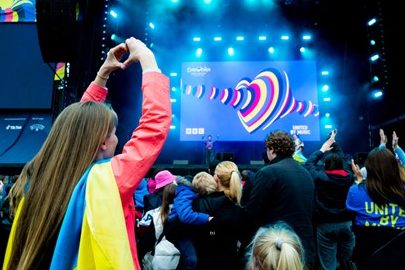City’s hosting of Eurovision has redefined the global competition, says report

Liverpool’s staging of last year’s Eurovision Song Contest, on behalf of Ukraine, has revolutionised the hosting of the contest, says an official report.
The city was chosen to host the event last May, due to Russia’s invasion of Ukraine, which had won the contest the previous year.
It welcomed visitors from around the world over several days with a total of 473,000 people attending Eurovision events with 306,000 additional visitors heading to Liverpool to be part of the celebrations, boosting the economy by £54.8m.
Now, with just days to go until Liverpool officially hands over the Eurovision key to 2024 hosts Sweden, an official report has concluded that the city has revolutionised the hosting of the contest.
Ground breaking research has been carried out to understand the power and impact on global cultural relations that the UK and Liverpool had when hosting the Eurovision Song Contest 2023.

Eurovision Village (Liverpool City Council)
Commissioned by the British Council, in partnership with Liverpool City Council and the Department for Culture, Media and Sport, the report uses extensive research, case studies and an international survey to explore whether the event resulted in encouraging future visits, new business opportunities and reputational uplifts for both Liverpool and the UK.
In considering Liverpool’s approach to hosting the competition on behalf of Ukraine, the report says: “Liverpool’s vision for achieving positive impact from the opportunity, has redefined the event’s politics of place in ways that can inspire future hosts.”
It recognises that what Liverpool staged was much more than an arena show and has laid the foundation for future hosts in how to communicate key narratives to a huge international audience.
As a result of the extensive host city programme curated and delivered by Liverpool City Council and its partners, combined with the high end output of the BBC and the support of the Government, it is acknowledged that Eurovision 2023 boosted Liverpool’s reputation as a city of music, a place with expertise of delivering immersive cultural events with strong community participation, and a leader in event evaluation.
The report praises the Euro Festival programme – a first for a host city – which saw 24 new artistic commissions, 19 of which were by Ukrainian artists, take over the city as part of the celebrations. It is noted that this approach forged new, creative partnerships with Ukraine and was a powerful way to showcase Ukrainian culture to diverse audiences. The city council’s partnership with the Ukrainian Institute and the British Council in the planning and delivery of this programme resulted in meaningful and tangible cultural relations.
The city-wide embrace of all things Eurovision was a key factor in how Liverpool was positively received. Local businesses and residents flying Eurovision, Ukraine and Pride flags reiterated the inclusivity and symbolised the nature of the event. This was seen as Liverpool successfully expressing its values of being a warm, welcoming and friendly city.
The limited timescales to deliver one of the biggest music events in the world is also spotlighted in the report, with praise given for going far beyond the basic pre-requisite of staging Eurovision, and instead delivering an ambitious, welcoming programme in half the time that would usually be allocated.
In a quote from a Spirit of 2012 representative: “I’m not sure it would be possible within the timeframe to have given it to a city that didn’t have that kind of overall sense of events.”

Future host cities are encouraged to adopt a similar approach to Liverpool’s evaluation methodology – again, the process was a first and highlighted that Eurovision 2023 generated £54m for the Liverpool City Region and welcomed 473,000 visitors. Liverpool has now set an example of what to assess and how to do it and it should be used as a blueprint for Malmö and other future host cities.
And it wasn’t just Liverpool that felt the benefit. The BBC also noticed increased reputational uplift for itself on the wider Liverpool City Region and the North of England after producing Eurovision, and a senior interviewee felt that the event had been “a unifying point across the political divide”, with cross-party support for solidarity with Ukraine and for the BBC.
In summing up how Liverpool could now be perceived internationally, the report says that hosting Eurovision has meant that the city isn’t just recognised for its association with The Beatles – it is now a leader when it comes to hosting large scale events and is somewhere that responds ambitiously and creatively to events.
Liverpool will officially hand over the Eurovision key to Sweden at the Insignia event in Malmö on Tuesday, January 30.
City council leader, Cllr Liam Robinson, said: “This for me is the most important piece of research to come out of Eurovision – we always knew there would be a massive economic boost which comes with staging an event of this scale, but the cultural diplomacy was an unknown. There will be real legacy from this event with new visitors, new investment and strengthened diplomatic ties.”
Mayor of the Liverpool City Region, Steve Rotheram, said: “Eurovision 2023 embodied something much greater than just a music contest – it was an incredible display of unity and creativity that showcased the very best of our area’s values. From the hundreds of thousands of visitors who flocked to our region for a fortnight of fun and frivolity, to the tens of millions around the world who tuned in, we showed them all the real Liverpool. Eurovision didn’t just change Liverpool, Liverpool changed Eurovision – and that’s exactly what this report shows.”
Rebecca Simor, Director Festivals and Seasons, British Council said: “Eurovision 2023 was a unique event in the song competition’s long history because of the tragic back-drop of war in Ukraine. The city of Liverpool used the opportunity of being in the global spotlight to project a powerful global message of welcome and inclusion, bringing the whole city to life with a unique arts festival of Ukrainian stories and celebration of Ukrainian culture.”

Phil Harrold, chair, BBC Eurovision Steering Group, said: “Showcasing the spirit of Ukraine and Liverpool to huge Eurovision Song Contest audiences across the world was an incredibly proud moment for the BBC.”
Some quotes from within the report include one from a European Broadcasting Union interviewee, who said: “Liverpool is an amazing best practice case study, because we can take what Liverpool has done in terms of impact assessment and show the next city… And then once we’ve gone through a number of years of having real best practice examples of impact assessment, that is a whole file of information we will absolutely give to the cities who are bidding for the following year’s contest.”
A Suspilne Ukraine interviewee (Ukrainian public broadcaster), said: “All anyone talked about afterwards, and at the time, was the Liverpool welcome … you can’t buy what that does for your reputation nationally and internationally.”








